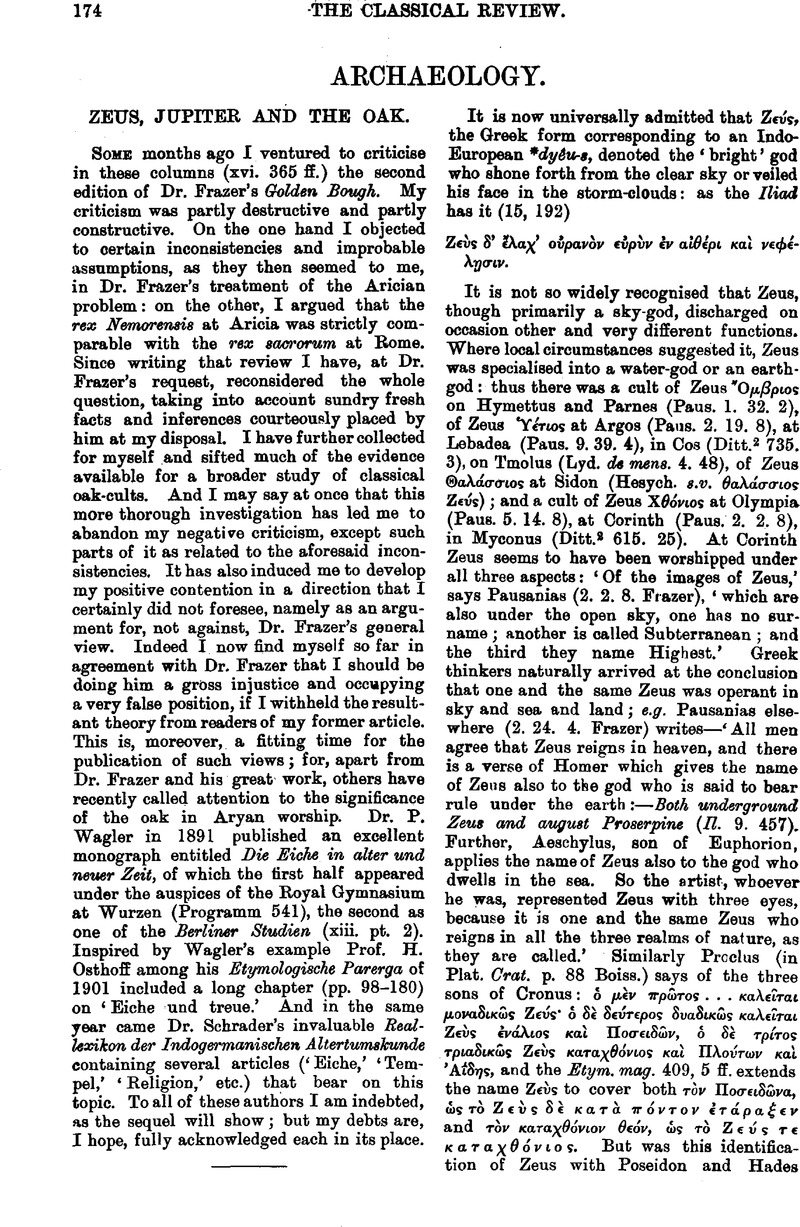Published online by Cambridge University Press: 27 October 2009

page 175 note 1 Dr. Frazer reminds me of the explicit statement in Verg. georg. 2. 325 ff. turn pater omnipotens fecundis imbribus Aether | coniugis in gremium laetae descendit, et omnis | magnus alit, magno commixtus corpore, fetus. Jupiter Pluvialis (C.I.L. ix. 324) and Jupiter imbricitor (Apul. de mundo 37) are strictly parallel to Ζεὺς Ὄμβριος and ![]() .
.
page 175 note 2 It is also worthy of mention that among the Aetolians, Lesbians, and Perrhaebians the month ![]() was called δῖος (Bissehoff de fastis Graecorum antiquioribus).
was called δῖος (Bissehoff de fastis Graecorum antiquioribus).
page 176 note 1 ![]() is perhaps a later form due, like
is perhaps a later form due, like ![]() , to a misconception.
, to a misconception.
page 176 note 2 Such forms as ![]() , are and ‘missbräuchlich’ (Kühner-Blass ii. 328).
, are and ‘missbräuchlich’ (Kühner-Blass ii. 328).
page 176 note 3 Proclus h. in Sol. 1 actually addresses the sun as ![]() .
.
page 177 note 1 11. 2. 513 speaks of ![]() . Does Aκιωρ the son of
. Does Aκιωρ the son of ![]() afford any clue to the difficult epithet
afford any clue to the difficult epithet ![]() ?
?
page 177 note 2 Possibly the same root recurs in the name of the town itself, ![]() .
.
page 179 note 1 The names are usually corrected to ![]() and
and ![]() .
.
page 179 note 2 Kretschmer Einleitung p. 256 f. holds that the suffix of these place-names is rather ![]() . In that case the first element of
. In that case the first element of ![]() would be a reduplicated Δώ, cp. Δωδώ (Simmias Rhod. ap. Steph. Byz. s. v. Δωδώνη).
would be a reduplicated Δώ, cp. Δωδώ (Simmias Rhod. ap. Steph. Byz. s. v. Δωδώνη).
page 181 note 1 ? cp. Hesych. ![]() , ‘forsan ob succisionem quercuum s. arborum’ (Steph. Thes. s.v.).
, ‘forsan ob succisionem quercuum s. arborum’ (Steph. Thes. s.v.).
page 182 note 1 The engraving has N A O Y by mistake for N A O | (Carapanos i. 46).
page 183 note 1 The illustrations in the text are from Carapanos ii. pi. iii 7 and pi. vii. 17.
page 184 note 1 Cp. the ![]() at Ceos (C.I.G. ii. p. 288, 31).
at Ceos (C.I.G. ii. p. 288, 31).
page 184 note 2 Phrixus got safe to Colchis, where he sacrificed the ram to Zeus ![]() and gave its fleece to Aeetes, son of Helios and Perseïs (Apollodor. 1. 9. 6).
and gave its fleece to Aeetes, son of Helios and Perseïs (Apollodor. 1. 9. 6).
page 184 note 3 Cp. Myth. Vat. 1. 24. pellem auream, in qua Juppiter in caelum escendit.
page 185 note 1 ![]() Q.
Q. ![]() V. Cp.
V. Cp. ![]() in the Samian story.
in the Samian story.
page 185 note 2 Creuzer Symbolik iv. 280, long since suggested that ![]() etc., are etymologically connected with
etc., are etymologically connected with ![]() , etc.
, etc.
page 185 note 3 The same phrase is used of Iris and Eileithyia in h. Apoll. 114, ![]() . But this appears to be a mere imitation of the line in the Iliad.
. But this appears to be a mere imitation of the line in the Iliad.